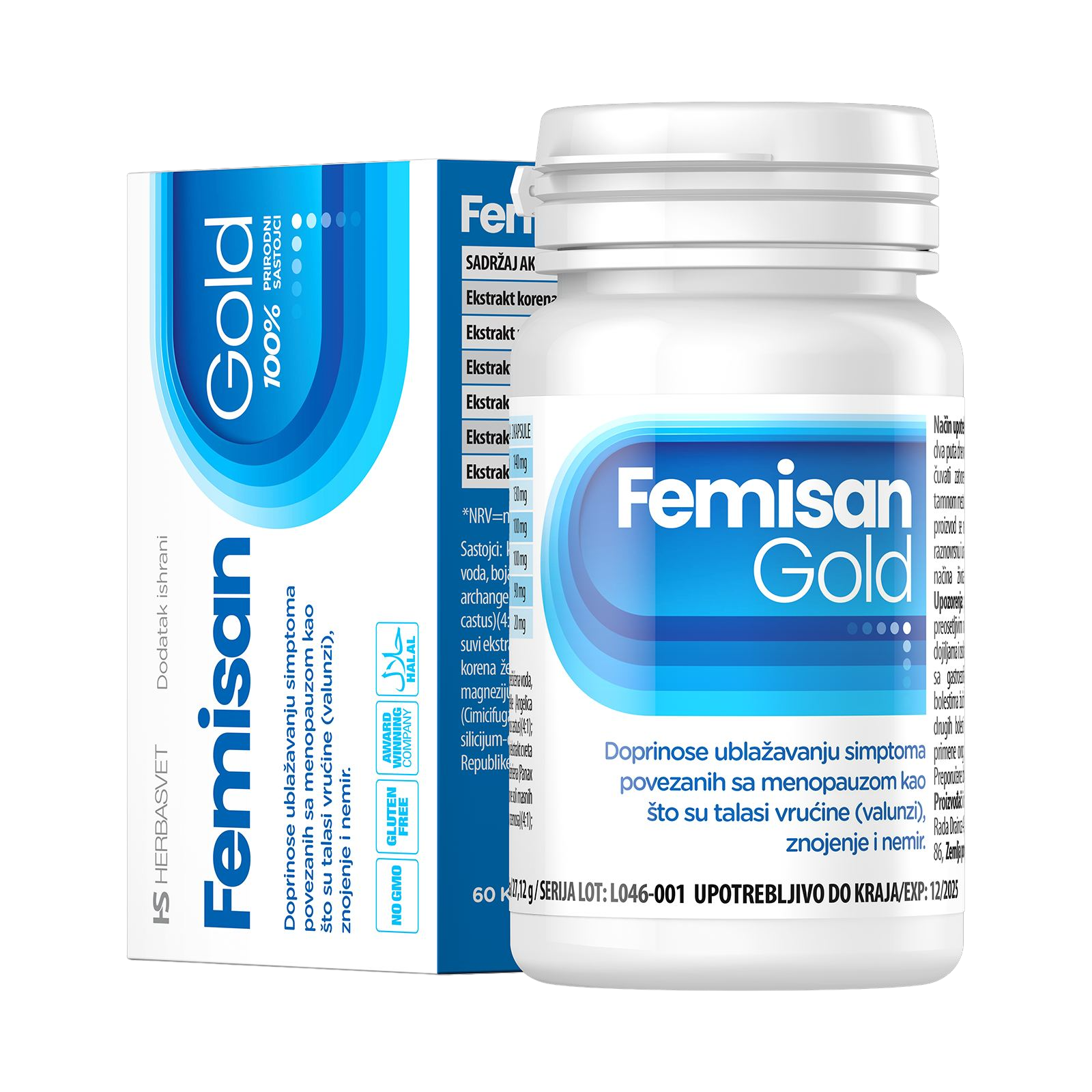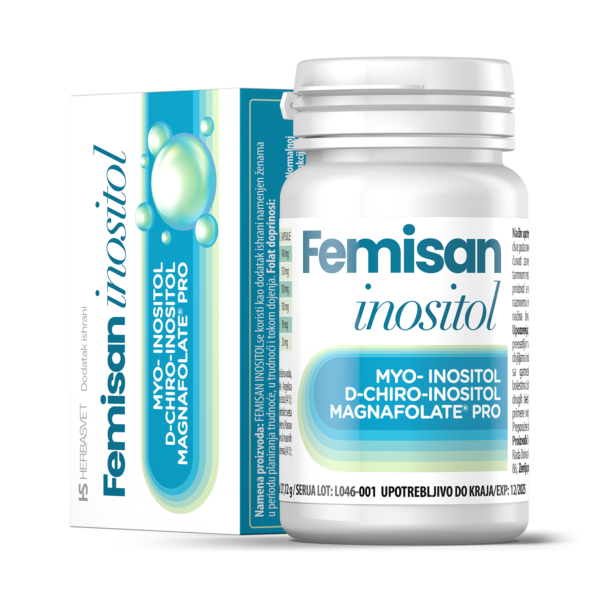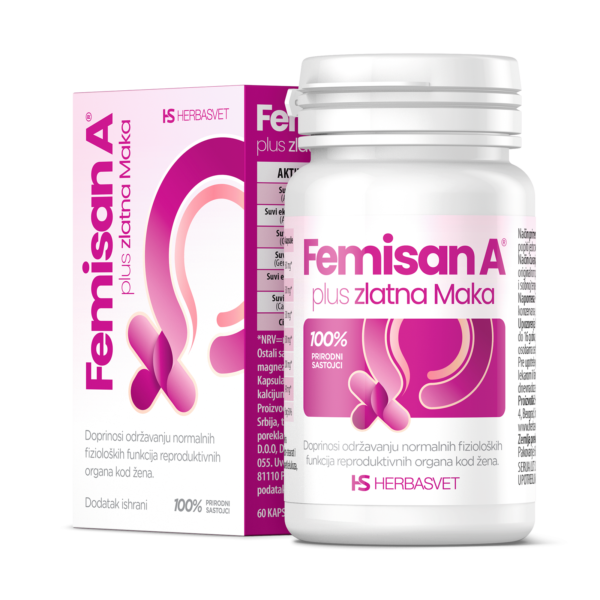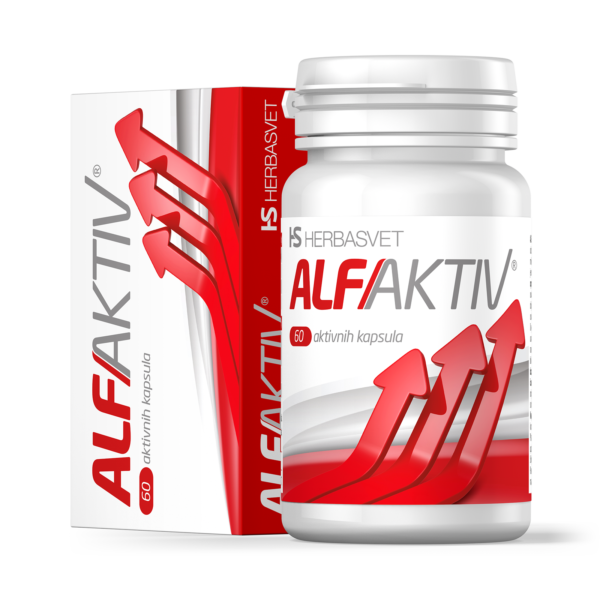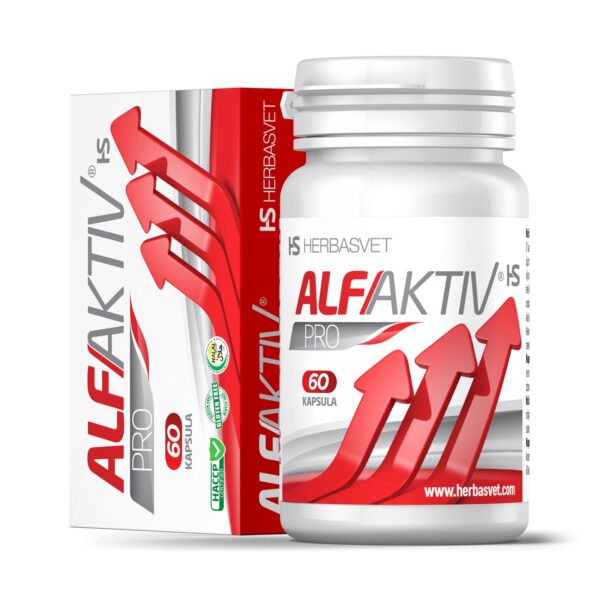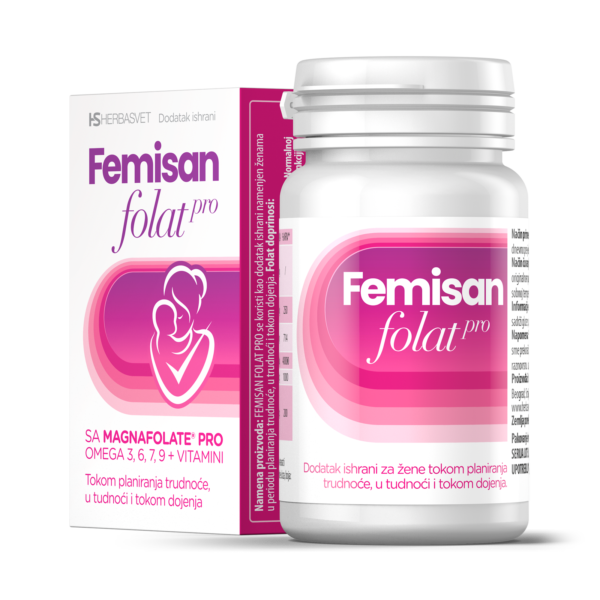FEMISAN GOLD CAPSULES IN PERIMENOPAUSE AND MENOPAUSE:
- Alleviates hot flashes
- Improves sleep
- Reduces tension and anxiety
- Improves resilience to stress
IN REPRODUCTIVE PHASE:
- Contributes to normal menstrual cycle and reduces symptoms of premenstrual syndrome.
Chaste tree, wild yam, hops and black cohosh contribute to alleviation of menopause symptoms, such as hot flashes, perspiration and tension.
Menopause means a permanent cessation of the ovarian function and a transition from the reproductive to the non-reproductive phase of a woman’s life. This is a period characterised by significant changes in hormones, which is accompanied by physiological and psychological symptoms. The average age for a woman to enter menopause is around 51, although today the threshold is moving more and more and there is an increasing number of cases in which menopause begins before the age of 40. But even if menopause finally occurs within the average age range, its symptoms can be felt much earlier, two to three, and sometimes even 10 years earlier.
Women feel the consequences of this completely natural transition period in two ways: in the beginning, in the period called perimenopause which spans the time from the onset of the first signs to the final entry into menopause – officially 12 months after the last menstrual period; at this time menstruations may often be absent and occasionally are abundant and may be accompanied by the following symptoms: hot flashes, sweating, insomnia, mood swings, nervous system hypersensitivity, irritability, skin changes, palpitations, difficulty thinking (brain fog) and memory problems. The reason for all this is a change in the secretion of hormones, primarily oestrogen, whose level drops sharply and fluctuates, and the body needs time to adapt to these changes.
Although these symptoms are unpleasant and impair the quality of life, the period when postmenopause finally starts is more dangerous, because at that time women become more susceptible to disorders that can be fatal if neglected. These are cardiovascular diseases, diabetes and osteoporosis. Before the onset of this period, the heart, blood vessels, metabolism and bones are also under the baton of oestrogen; when the protective effect of this hormone weakens and ceases, the bones can weaken rapidly, i.e. their density becomes thinner, and the blood vessels deteriorate faster, which increases the risk of stroke and heart attack. Also, without oestrogen, visceral (deep) fats accumulate more easily, mostly around vital organs, which represents an additional risk not only of obesity but also of metabolic syndrome and diabetes.
Studies that observed women who entered menopause early, before the age of 47, found that they are at a much higher risk of developing osteoporosis, are more prone to bone fractures and have higher mortality later in life. Similar statistics exist for the heart and blood vessels. Cardiovascular disease is the leading cause of death in women and the risk increases dramatically with menopause, especially if it occurs prematurely. In this case, the risk of women developing cardiovascular disorders after the age of 60 is doubled. Women who enter menopause after hysterectomy are also at the same risk – and they have a higher stiffness of the arteries.
Unfortunately, that is not the end. Women who enter menopause before the age of 40 are as much as 32 per cent more likely to develop type 2 diabetes than women whose menopause occurs between the ages of 50 and 54. Today, we are seeing an increase in metabolic syndrome – a set of disorders that include the deposition of visceral fat, high blood pressure, elevated cholesterol and triglycerides, and insulin resistance. If left untreated, metabolic syndrome is a sure path to diabetes and serious cardiovascular disease. The dominance of testosterone during the transition to menopause is one of the most important triggers of the metabolic syndrome. Some studies have shown that the risk of this syndrome increases with age, and is as much as 38 per cent higher in women aged 60-79.
In addition to suffering physiological disorders during the transition period, women are more affected by psychological changes as they often have the feeling that they completely lose control of themselves. Women are at twice the risk of developing depression and disorders than men, precisely because of hormonal oscillations. During menopause, they are especially prone to depression, due to the physical symptoms that accompany this transition, due to inadequate social support, their lifestyle, but also a lack of understanding of the mechanisms of menopause. In fact, the risk of depression is the strongest in the transition period between the late reproductive years and postmenopause; research has shown that menopause directly “attacks” the structure of the brain, brain connections and energy metabolism. Although it is viewed as a transition from the reproductive state, menopause also includes a neurological transition and thus the likelihood of neurological diseases increases. In this light, menopause can affect the onset and accelerate the course of Alzheimer’s disease.
Menopause has been proven to affect cognitive functions and memory, for which oestrogen is directly responsible. However, the good news is that the condition improves in postmenopause, which indicates that sudden hormonal changes are responsible for the mental fog. This is also proven by the knowledge that during the onset of hot flashes, memory drastically deteriorates. In women with frequent hot flashes, changes in the myelin sheath of the nerves have been noticed, which explains this phenomenon, and which is actually good news, because the reduction of the frequency and intensity of hot flashes can prevent negative cognitive changes. These changes affect not only memory and thought processes, but also the quality of sleep and ability to rest, as well as having an impact on the social sphere of life. Therefore, a drastic oscillation of oestrogen during perimenopause can lead to complete mental and physical exhaustion, which can affect all areas of life and lead to actions and cause changes that we can regret later.
In order to preserve the protective effect of oestrogen for as long as possible, hormonal replacement therapy is usually recommended. However, especially when used over a long period of time, it also carries its own risks, especially the risk of breast cancer. Therefore, a better solution is to help our body adjust, reduce strong oscillations of hormones, alleviate symptoms, and at the same time reduce the risks that accompany menopause as much as possible. Fortunately, all this is possible with the help of medicinal herbs that women have used for centuries to help themselves in the transition period. This traditional knowledge has been confirmed by science which discovered the combinations and proportions of medicinal herbs that give best results, and also worked out what their mechanisms are.
FEMISAN GOLD CAPSULES is exactly that kind of supplement, in which chaste tree, wild yam, hops, black cohosh, angelica and ginseng have a strong individual and synergistic effect. As women statistically spend almost a third of their lives in postmenopause, it is worth making sure that this period should be carefree and pass in good health.
The importance of phytoestrogenic plants for women’s health has been noticed while observing women from East Asia who traditionally consume large amounts of soy. Compared to women in the west, there is a drastically lower number of cases of breast cancer among them. However, when Japanese women emigrate to the United States and change their dietary habits, their female offspring become susceptible to breast cancer in the same proportion as the rest of the population in the west (https://clinphytoscience.springeropen.com/articles/10.1186/s40816-015-0013-0). The reason is that isoflavones, phytoestrogens from soy and similar plants represent a natural protection against breast cancer.
CHASTE TREE (Vitex agnus castus) has components that are similar in their structure and function to the female hormones oestrogen and progesterone. Phytoestrogens are non-steroidal compounds that act as oestrogen and consist of isoflavones, lignans and coumestans. In addition to oestrogen, they also have an anti-inflammatory effect, and have been proven to improve cognitive functions during the transition period.
A study that compared chaste tree and placebo therapy for menopausal symptoms concluded that this plant has a phytoestrogenic effect that significantly alleviates menopausal symptoms, both somatic and mental. Another study examining the effects of this herb found a large reduction in the frequency and intensity of hot flashes and recommended it as an effective therapy for treating a range of vasomotor symptoms in postmenopausal women. But the effect of chaste tree goes even further: its excellent anti-aging effect has been proven by studies, in addition to its ability to prevent oxidative stress, compensate for hormone deficiency and prevent endometrial atrophy. And when it comes to the impact of menopause on brain changes, chaste tree also has a solution: this plant improves cognitive functions, memory and increases the transcription of oestrogen receptors in the hippocampus.
WILD YAM (Dioscorea villosa L.) contains diosgenin, a phytoestrogen that most closely resembles progesterone. Diosgenin was an ingredient used in the first contraceptive pill in the 1960s. Recently, a protein was isolated from wild yam that showed a great potential to substitute menopausal hormone replacement therapy without any negative side effects. Studies in rats have shown that this protein stimulates the secretion of estradiol and progesterone, prevents the progression of osteoporosis and increases bone mineral density, improves cognitive functions, and most importantly – does not cause the growth of breast and ovarian cancer cells. Wild yam has been proven to protect the body from the harmful effects of foreign particles and has an anti-inflammatory effect, which protects the whole body and has an analgesic effect. Its ability to act as an anti-invasive agent in breast cancer is especially important and some studies have shown its ability to reduce the absorption of cholesterol, which makes it an excellent prevention of metabolic syndrome.
HOPS (Humulus lupulus L) is best known for its use in beer, but it has always been appreciated for its calming effect that enables good sleep. Today we know that hops has a wide range of positive effects – oestrogen, anti-tumour, neuroprotective, anti-inflammatory and antimicrobial – and is an excellent alternative to hormone replacement therapy. In addition to effectively calming nervous tension in menopause, hops has been shown to effectively soothe hot flashes and other vasomotor symptoms such as sweating, sleep disturbance and a feeling of exhaustion; more recently, research has proven the ability of phytoestrogens in hops, 8-prenylnaringenin, to reduce LH and FSH levels, while increasing prolactin levels and accelerating the regeneration of vaginal hyperplastic epithelium. Hops extract has been shown to have the ability to bind strongly to oestrogen and progesterone receptors. In fact, 8-prenylnaringenin is the strongest phytoestrogen ever isolated. Apart from the fact that hops effectively reduces the symptoms of menopause, there are no negative drug interactions, no side effects and therefore it is recommended for the general improvement of a woman’s quality of life in this period.
BLACK COHOSH (Actaea racemosa L. syn Cimicifuga racemosa) is another plant that is increasingly used as an alternative to hormone replacement therapy. It was also used by members of the American Indian tribes to relieve pain in muscles and joints, neuralgia, rheumatism and gynaecological problems. Recent research has confirmed that this plant does not contain oestrogen compounds, but that it achieves its effectiveness through mechanisms associated with the presence of substances that stimulate the secretion of the “happiness hormone” dopamine, serotonin, as well as GABA (gamma aminobutyric acid), a neurotransmitter that sends signals to the brain, nervous system, and whose level is often low in menopause, which causes depression. Studies have proven that blach cohosh has a positive effect on vasomotor symptoms of menopause, as well as on mental, physical and sexual difficulties during four and eight week applications.
ANGELICA (Angelica arheangelica L.) is a plant widely represented in traditional medicine; thanks to its natural antiseptic, antispasmodic, diuretic and anti-inflammatory properties, it is widely used for a number of disorders. It is also known as a plant of long life, and coumarins in it have a mild antidepressant and sedative effect, which is very welcome during the mental challenges of menopause; it also contributes to the protection of cognitive functions. Furthermore, with its proven anti-tumour effect it provides protection to women against breast cancer, and as an excellent cleanser of the body, it protects the liver and facilitates lymph flow function, thus contributing to the fight against metabolic syndrome. In addition to being a true protector of women during menopause, angelica also relieves its symptoms, such as hot flashes, without any negative effects; and with its mild oestrogenic effect it restores vaginal epithelium and reduces dryness.
GINSENG (Panax ginseng) is a plant that has been used for millennia in traditional Eastern medicine to treat a number of diseases, including cancer and cardiovascular disorders. This plant is a strong adaptogen – it helps the body cope with challenges and adapt to stressful situations and it protects it from their negative consequences. Ginseng has been shown to improve mental function and prevent cognitive decline, protect the body from oxidative stress and boost antioxidant capacity; it is also known as a major protector of the cardiovascular system, which is especially important for women in menopause. Recent studies have also confirmed ginseng’s positive role in alleviating menopausal symptoms, especially when it comes to hot flashes, low libido or sexual dysfunction, most likely thanks to the oestrogenic effect of this plant. Namely, ginseng has a proven effect on oestrogen and androgen receptors, thanks to the unique ginsenosides, phytoestrogens that are part of it, to which ginseng owes a number of medicinal properties, and which have the power to prevent the growth of tumour cells, especially in diseases caused by hormonal changes such as breast cancer. Ginsenosides have a series of beneficial effects in cardiovascular diseases, including antioxidant effect, they help control vasomotor functions, improve the lipid profile, regulate blood pressure and cardiac function and prevent platelet adhesion. And, to crown all this, ginsenosides directly affect the composition of bones, promote osteogenesis and the work of osteoprogenitor cells, and thus provide great protection against osteoporosis.
All these herbs in their most useful and purest form are part of FEMISAN GOLD CAPSULES and their synergistic effect provides not only relief when it comes to unpleasant symptoms of menopause, but also long-term protection against disorders that women are prone to in this phase of life. The dosage is very simple: two capsules should be taken twice a day preferably before a meal. FEMISAN GOLD CAPSULES – for a carefree golden age.
STANDARDS
FEMISAN GOLD CAPSULES is a gluten-free product, made in accordance with Good Manufacturing Practice, in compliance with the requirements of ISO9001:2015 standards and HACCP quality control systems.
REGISTRATION
FEMISAN GOLD CAPSULES was entered into the register of the Ministry of Health of the Republic of Serbia no 20803/2022 from 21.04.2022.
